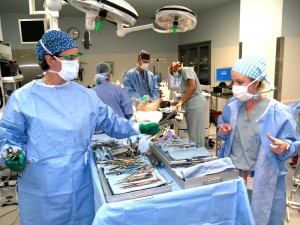By Rose O. Sherman, EdD, RN, FAAN
“Always remember that the future comes one day at a time” Dean Acheson
 This week, I am in Las Vegas presenting at the OR Manager conference. Perioperative nursing is not my specialty. I recently completed research in collaboration with the leadership of OR manager to determine perioperative nurse leader viewpoints on succession planning. I was surprised by the results of our survey completed by 256 perioperative nurse leaders across the nation, and by my subsequent discussions with perioperative nurse leaders about the findings.
This week, I am in Las Vegas presenting at the OR Manager conference. Perioperative nursing is not my specialty. I recently completed research in collaboration with the leadership of OR manager to determine perioperative nurse leader viewpoints on succession planning. I was surprised by the results of our survey completed by 256 perioperative nurse leaders across the nation, and by my subsequent discussions with perioperative nurse leaders about the findings.
For many of us, perioperative nursing is something that takes place behind the double doors of our hospitals and off limits to most other staff. What is clear from our work is that there is a crisis brewing in perioperative nursing. We tend to look at nursing shortages as a global issue that impacts all specialities equally but this is not true. Perioperative nursing may be ground zero for the coming nursing shortage. Nurses in this specialty have been concerned for many years about their somewhat unique challenges, but have had difficulty getting the attention of the rest of the nursing to tell their story. So here is what I learned from my research with perioperative nurses.
The Perioperative Nursing Workforce is Aging and Shortages already Exist
As a specialty area, nurses working in perioperative nurses are older and more experienced than the general nursing workforce. They have not retired on the same timeline as in the past because of the economy. Yet, 56% of perioperative nurse leaders report that they are already having problems with recruitment and 68% anticipate problems within 5 years based on the age of their staff. Because of economic issues and reduced surgical volumes, core staffing in many perioperative departments has been reduced making it hard to bring on newer nurses. The situation with perioperative nurse leaders is even more critical. 20.7% of current OR Managers are over the age of 60 and almost 2/3 are over the age of 50. 21.5% plan to retire within three years and 37.5% by 2018. They are making their retirement with full knowledge of today’s economy. There is great concern about the pipeline for both staff nurses and leaders.
Younger Nurses are not exposed to Perioperative Nursing Today
Perioperative experience and exposure has been eliminated from the nursing curriculum in most nursing programs in the United States. Perioperative nurses have long argued that there is no better place than the OR to learn about sterile technique, develop skills such as IV and foley placement and observe teamwork in action. Without exposure to perioperative nursing, students often don’t even think about this specialty as a possibility when they plan their future career. There is no other specialty in nursing that has this unique challenge as they move to build a pipeline of future nurses.
Why We Need to be Concerned
Patient Access – A severe shortage of perioperative nurses could have devastating impact on our healthcare delivery system. With healthcare reform, it is estimated that up to 32 million US residents will become insured and begin using the healthcare system. Some of these individuals have postponed needed surgeries and surgical volumes are expected to significantly increase. Last month, the Journal of the American Medical Association published a study evaluating the surging number of Total Knee replacements. There has been a 161.5% increase since 1991 and with 8000 Baby Boomers retiring each day – the number of TKA is expected to skyrocket.
Patient Safety – The current perioperative nursing workforce is very experienced in their work. With their departure from the workforce, there is the potential of a huge loss of knowledge in this specialty area that could impact patient safety.
Economic Losses for Hospitals – Data from the Health Financial Management Association indicates that Perioperative Departments contribute 40-60% of total revenue for most of the 5000 hospitals in the United States. They are described as “Economic Engines” of hospitals today. But what if surgeries are delayed, and OR rooms are not used because of staffing issues. This has the potential to seriously impact the bottom line of hospitals which are already struggling with declining reimbursements. These economic engines also rely on the sophisticated management skills of Perioperative Directors. Our survey results indicated that perioperative departments today are being managed by very seasoned nurse leaders with broad experience in the OR —-72% have more than 10 years of perioperative leadership experience. The impact of the loss of these nurse leaders is sure to be felt in the efficient running of these important business lines yet fewer than 40% of hospitals have done succession planning.
The results of our survey are a call to action for nurse leaders and educators – there is no time left to waste if an effective leadership and staff transition is to occur. Without this, we risk disruption of surgical services for patients, economic issues for hospitals and the loss of a tremendous amount of perioperative nursing knowledge.
Read to Lead
© emergingrnleader.com 2012


 LinkedIn
LinkedIn Instagram
Instagram